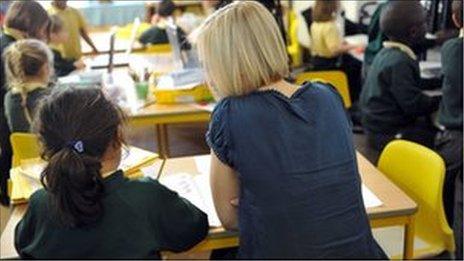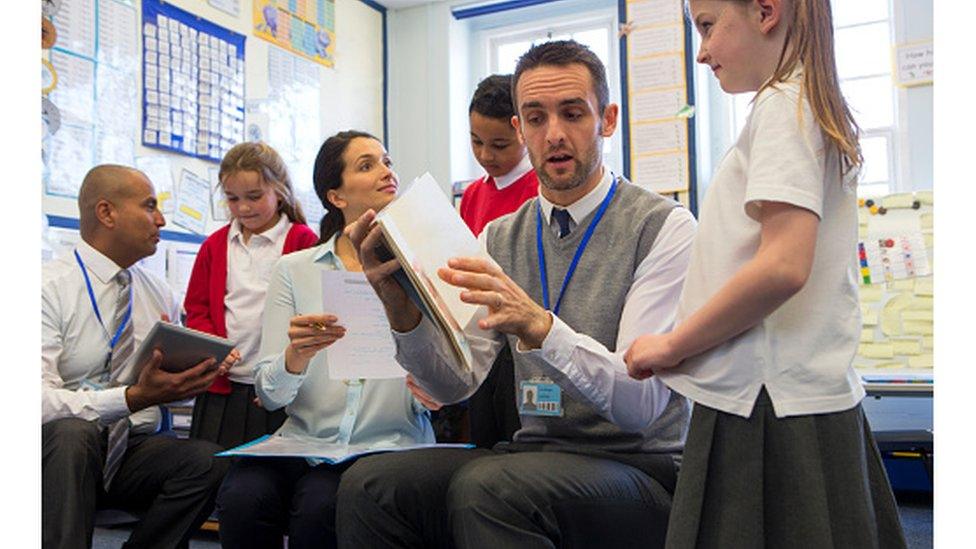Academies programme £1bn over budget, says watchdog
- Published

By September 2012, 48% of secondary pupils were attending academies
A tenfold increase in the number of English schools converting to academies has meant £1bn in extra costs, says the government's spending watchdog.
The Department for Education (DfE) met the expense from its overall budget, says the National Audit Office report.
"The department was unprepared for the financial implications of rapid expansion," the authors say.
The government said it made "no apology for spending money on a programme that is proven to drive up standards".
In May 2010 there were 203 academies, which are publicly funded independent state schools directly accountable to the DfE and outside local authority control. The programme was started by the Labour government as a way to transform struggling schools.
After the election the Education Secretary, Michael Gove, announced plans to allow all schools in England to convert to academy status. By September 2012 some 2,309 schools had converted, representing a growth of 1,307%, and 48% of secondary pupils were attending academies.
'Significant achievement'
Amyas Morse, head of the National Audit Office (NAO), said the increase was "a significant achievement - however the Department for Education was not sufficiently prepared for the financial implications of such a rapid expansion, or for the challenge of overseeing and monitoring such a large number of new academies".
According to the report, the department had budgeted £7.3bn to set up and run academies in the two years from April 2010 to March 2012.
It says officials were expecting some extra expenditure, to cover factors such as additional insurance, but were unprepared for the numbers of academies wanting to convert. In fact the total expenditure on academies amounted to £8.3bn - £1bn over budget.
The £1bn includes £350m paid to local authorities for temporary continued funding of places at non-academy schools, effectively double funding places while academies were being set up.
The report says that to fund the expansion and remain within overall spending limits, the DfE had to find the money from other budgets, including the main schools settlement.
A spokesman for the Department for Education said: "We make no apology for the fact that more schools than even we imagined have opted to convert, and no apology for spending money on a programme that is proven to drive up standards and make long-term school improvements.
"We want as many schools as possible to take advantage of the significant benefits academy status brings because it means more schools run by great heads and teachers, not local authority or Whitehall bureaucrats, and more children getting a first-class education.
"The Department for Education has made significant savings in the last two and a half years and also set aside significant contingencies which have been set against the growth in academies.
"Additionally, the costs of converting academies have already fallen by 53% per academy. We anticipate further changes we are making will radically reduce costs in 2013-14 and beyond."
'Political ideology'
Margaret Hodge MP, chairwoman of the Commons public accounts committee, said: "The decision to change fundamentally the nature of the programme away from one solely directed at struggling schools is up to the government, but taxpayers have the right to expect a more considered and controlled approach to public spending than the department has so far displayed."
Shadow education secretary Stephen Twigg called for greater scrutiny, oversight and local accountability "to ensure school standards improve and the taxpayer gets value for money".
The figures also drew criticism from teaching unions with Mary Bousted, of the Association and Teachers and Lecturers, saying they showed "only too clearly that the expansion of academies is being driven by political ideology and not by what's best for children's education".
Christine Blower, of the National Union of Teachers, said: "It is absurd for the government to justify spending £8.3bn on academy conversions in two years while at the same time warning of a dire economic situation. Meanwhile, many good state schools are told there's no money as they stand in a state of disrepair with ever-diminishing support services."
- Published26 August 2011

- Published7 May 2016

- Published27 January 2011